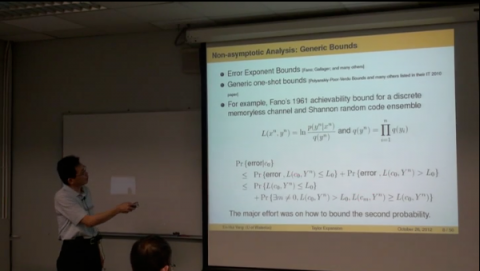
Recently there has been a renewed interest in non-asymptotic information theory. Given any memoryless channel with discrete input alphabet, but arbitrary output alphabet, in this talk, the maximum transmission rate achievable with finite block length n and codeword type t subject to error probability ε will be analyzed as a function Rn(t,ε) . Non-asymptotic, easy to compute upper and lower bounds on Rn(t,ε) , will be presented. By introducing a quantity δt,n(ε) to measure the relative magnitude of error probability ε and block length n with respect to the given channel and type t and by combining the upper and lower bounds, it is shown that Rn(t,ε) has a Taylor-type expansion with respect to δt,n(ε). A similar Taylor-type expansion is also valid for Rn(ε) = maxt Rn(t,ε). Based on the Taylor-type expansions and non-asymptotic upper bound, two easy to compute approximation formulas for Rn(t,ε) ( Rn(ε) , respectively) (dubbed “SO” and “NEP”) will be provided. Numerical results show that both the SO and NEP approximation formulas provide reliable and accurate estimations for Rn(t,ε) ( Rn(ε), respectively), in contrast with the normal approximation which sometimes falls below achievable bounds and sometimes rises above converses. At the end of the talk, the Taylor-type expansion of capacity will be applied to an LTE system to adaptively select constellation and rate, revealing interesting, new combinations of constellation and rate which yield significantly better performance in comparison with corresponding combinations suggested in the LTE system. This is a joint work with Jin Meng.
En-hui Yang has been with the Dept. of Electrical and Computer Engineering, University of Waterloo, Ontario, Canada since June 1997. He spent his sabbatical leave at the Chinese University of Hong Kong from 2003 to 2004. He is the founding director of the Leitch-University of Waterloo multimedia communications lab, and a co-founder of SlipStream Data Inc. (now a subsidiary of Research In Motion). He currently also serves as an Overseas Advisor for the Overseas Chinese Affairs Office of the City of Shanghai, and is sitting on the Overseas Expert Advisory Committee for the Overseas Chinese Affairs Office of the State Council of China and a Review Panel for the International Council for Science.
A Fellow of IEEE, the Canadian Academy of Engineering, and the Royal Society of Canada (The Academies of Arts, Humanities and Sciences of Canada), Dr. Yang is also a recipient of several research awards including the prestigious Inaugural (2007) Ontario Premier’s Catalyst Award for the Innovator of the Year, and the 2007 Ernest C. Manning Award of Distinction, one of the Canada’s most prestigious innovation prizes. Products based on his inventions and commercialized by SlipStream received the 2006 Ontario Global Traders Provincial Award. With over 190 papers and more than 200 patents/patent applications worldwide, his research work has had an impact on the daily life of hundreds of millions people over 170 countries either through commercialized products, or video coding open sources, or video coding standards. In 2011, he was selected for inclusion in Canadian Who’s Who.
